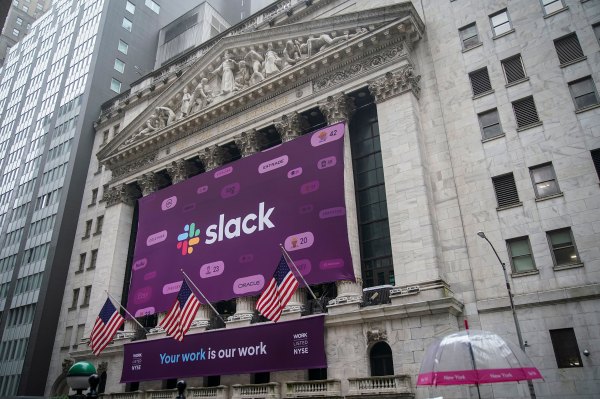It was a historic day for Slack (NYSE: WORK). The workplace communication software juggernaut debuted on the New York Stock Exchange up 48% at $38.50 per share after reports emerged Wednesday night that the business had agreed to a reference price of $26 per share.
Slack, founded in 2009 as Tiny Speck, closed up 48.5% Thursday at $38.62 per share. The stock had climbed as high as $42 in intraday trading. Slack’s market cap now sits well above $20 billion, or nearly 3 times its most recent private valuation of $7 billion.
Slack on Thursday became the second large venture capital-backed business to complete a direct listing, an alternative path to the public markets that allows businesses to go public without selling new shares of its stock. Instead, companies are able to bypass the exorbitant fees associated with initial public offerings, like completing a roadshow and hiring investment bankers, and begin trading by selling existing shares held by investors, insiders and employees.
Slack co-founder and chief executive officer Stewart Butterfield is now a billionaire, having held on to an 8.6% stake worth $1.6 billion at the opening price. Accel, its largest shareholder, boast a stake worth a whopping $4.6 billion. Other key shareholders include Social Capital, which owns a stake worth $2 billion, Andreessen Horowitz ($2.6 billion), SoftBank ($1.4 billion) and Slack co-founder Cal Henderson ($646 million).
Slack’s successful opening isn’t surprising. Of the tech businesses to go public in 2019, the enterprise SaaS IPOs (Zoom, PagerDuty, etc.) have performed best. According to SharesPost, enterprise SaaS IPOs are trading, on average, at more than 100% above their IPO price.
Direct listings are a rather risky path to the public markets because of its unproven nature. In Slack’s case, it’s benefited from both its globally renowned brand and Wall Street’s insatiable desire to invest in SaaS.
Spotify, another notable business that opted for a direct listing, has performed relatively well since exiting in 2018. Initially, the music streaming business opened trading up 25% from its reference price of $132 before closing down 10% after its first day of trading.
Slack has previously raised a total of $1.2 billion in funding from investors, including Accel, Andreessen Horowitz, Social Capital, SoftBank, Google Ventures and Kleiner Perkins. In late 2018, the company closed on more than $400 million in new funding at a valuation of $7.1 billion.
Now that it’s public, all eyes will be on its financials. Weeks ahead of its direct listing, Slack posted an amended S-1 with an updated look at its path to profitability.
Slack posted revenues for the fiscal first quarter ending April 30 of $134.8 million on losses of $31.8 million. Slack’s most recent revenues represent a 67% increase from the same period last year when the company lost $24.8 million on $80.9 million in revenue.
For the fiscal year ending January 31, 2019, the company reported losses of $138.9 million on revenue of $400.6 million. That’s compared to a loss of $140.1 million on revenue of $220.5 million the year prior.
